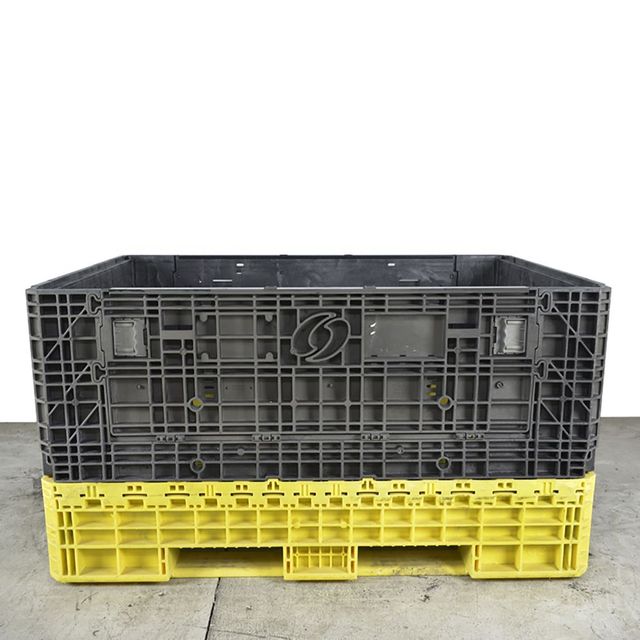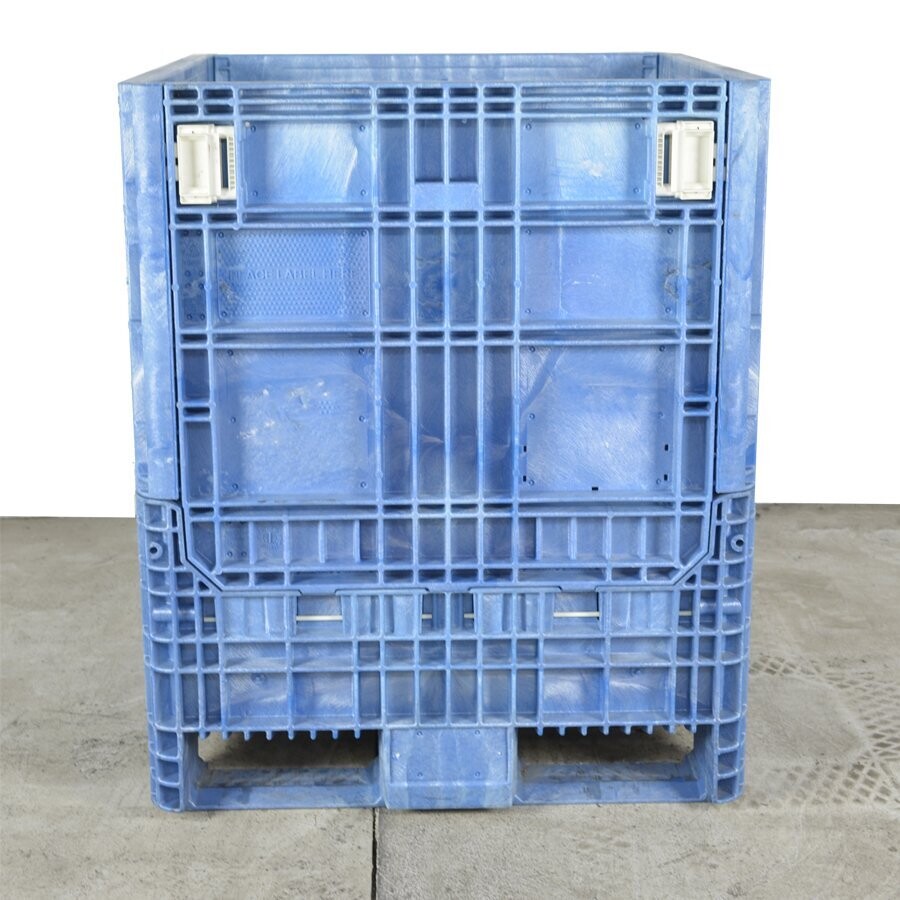The importance of used plastic containers in sustainable material handling
Why Mass Containers Are Crucial for Affordable and sustainable Transportation
Mass containers play an essential role in modern logistics. They facilitate the efficient activity of big quantities of goods, consequently maximizing transportation processes. This approach not just decreases costs yet additionally reduces environmental impact via reduced discharges and waste generation. As industries look for more sustainable practices, the adoption of bulk containers is coming to be progressively considerable. What ramifications does this change hold for future logistics and supply chain administration?

The Benefits of Using Bulk Containers in Logistics
Mass containers revolutionize logistics by improving effectiveness and sustainability. These containers permit the transport of large amounts of products in a solitary trip, noticeably lowering the variety of journeys called for. This not just streamlines operations yet additionally lessens labor costs connected with handling, packing, and unloading. In enhancement, mass containers are made to enhance room usage within transport vehicles, making certain that even more items can be delivered all at once.
The standardization of mass containers additionally simplifies the logistics procedure. With consistent dimensions, they can be quickly stacked and saved, resulting in enhanced stockroom administration. Mass containers typically include long lasting materials that shield materials from damages throughout transit, thereby lowering item loss and boosting general integrity. Therefore, businesses can experience improved supply chain efficiency, eventually leading to increased productivity and client fulfillment. This combination of elements makes bulk containers a critical asset in modern logistics.
Ecological Impact: Lowering Waste and Carbon Footprint
As industries significantly focus on sustainability, the fostering of bulk containers has actually arised as a key method for reducing waste and lowering carbon impacts. These containers minimize making use of product packaging materials, such as boxes and plastic, thus especially reducing total waste generation. By settling deliveries, bulk containers boost transport efficiency, enabling for even more items to be transferred per trip. This decrease in journeys straight correlates with reduced greenhouse gas discharges, adding to a smaller carbon impact.
Mass containers can usually be recycled or reused, better reducing environmental effect. The sturdiness of these containers assurances they can endure multiple transport cycles, minimizing the need for single-use choices. used plastic containers. By improving logistics and promoting effective source usage, mass containers not just sustain lasting practices but also motivate sectors to straighten with global ecological objectives. Inevitably, their implementation shows a commitment to ecological stewardship and accountable source administration
Price Financial Savings: How Mass Containers Lower Transportation Expenditures
While many companies seek means to enhance their bottom line, the use of mass containers offers a substantial possibility for lowering transportation expenses. Bulk containers optimize the volume of products moved, permitting organizations to deliver larger amounts at the same time. This efficiency minimizes the number of journeys called for, directly decreasing gas costs and lessening labor costs related to loading and discharging.
Furthermore, mass containers typically feature streamlined layouts that enhance space application within transport lorries. This implies fewer voids, bring about a lot more efficient use readily available capability. Furthermore, the durability of mass containers can reduce the risk of item damages throughout transportation, making certain and decreasing losses that more products get here undamaged.
Enhancing Supply Chain Efficiency With Mass Storage Solutions
Bulk storage options play a vital function in improving supply chain efficiency by maximizing inventory management. By consolidating products right into fewer, bigger containers, businesses can substantially decrease taking care of expenses associated with frequent transfers and processing. This streamlined method enables for far better monitoring and monitoring of supply, ultimately resulting in enhanced operational efficiency.
Structured Inventory Management
Efficient stock monitoring is important for enhancing supply chain procedures, especially when companies take on bulk storage space solutions. These solutions allow services to keep higher stock levels while reducing the frequency of replenishment. By consolidating products right into mass containers, companies can streamline their inventory procedures, lowering the intricacy connected with tracking multiple smaller plans. This approach facilitates accurate supply counts and improves projecting precision, enabling more educated decision-making. In addition, mass storage solutions streamline stockroom organization, making it less complicated to situate and gain access to products when required. Consequently, companies can attain a more reliable inventory turn over price, ultimately enhancing general supply chain efficiency and reducing the possibility of stockouts or overstock scenarios.

Decreased Handling Expenses
The application of mass storage remedies not only enhances stock monitoring yet likewise substantially minimizes taking care of expenses across the supply chain. By consolidating products into bulk containers, firms minimize the requirement for regular handling and transfer in between various storage space and transportation systems. This method minimizes labor costs connected with loading, discharging, and relocating smaller sized packages. Additionally, bulk storage space lowers the frequency of deliveries, bring about lower transport expenses and lowered gas consumption. Consequently, organizations can optimize their logistics operations, enabling for an extra reliable allotment of sources. Eventually, minimized handling costs contribute to improved general supply chain efficiency, cultivating an environment that supports both sustainability and financial practicality.

Adaptability of Bulk Containers Throughout Different Industries
Many sectors have distinctive requirements for transportation and storage space, mass containers have actually emerged as a versatile option that fulfills a wide array of demands. These containers, varying from big containers to specialized tanks, can fit varied materials, consisting of granules, fluids, and powders. In the farming market, bulk containers assist in the transport of fertilizers and grains, while the food and drink sector utilizes them for active ingredients and ended up items. The chemical sector counts on bulk containers for safely moving hazardous materials, making sure compliance with safety and security laws. Additionally, building companies benefit from mass containers for transferring accumulations and other materials. Their adaptability prolongs to different modes of transport, consisting of vehicles, ships, and trains, improving logistical performance. This adaptability not just enhances procedures across different industries yet additionally advertises sustainability by reducing packaging waste and maximizing room in transit. Bulk containers play an important role in modern supply chain monitoring.
Future Fads in Bulk Container Use and Sustainability
The future of mass container usage is significantly formed by ingenious materials advancement that enhances sustainability. Furthermore, automation in logistics guarantees to streamline procedures, minimizing waste and improving performance. Embracing round economy techniques will further transform just how bulk containers are developed, made use of, and recycled, cultivating a more lasting transportation landscape.
Innovative Materials Growth
As markets increasingly focus on sustainability, ingenious materials development wholesale containers arises as a considerable consider improving environment-friendly transport services. Scientists and producers are checking out naturally degradable plastics, recycled compounds, and light-weight metals to reduce environmental effect. These products not only reduce waste yet likewise boost fuel effectiveness by lowering the overall weight of containers. Furthermore, advancements in wise products, which can adjust to varying conditions, boost the durability and functionality of bulk containers. The integration of these ingenious products straightens with round economy principles, advertising reuse and recycling. As the need for lasting techniques grows, the advancement of such materials will certainly play an essential duty fit the future of mass container usage in logistics and transportation.
Automation in Logistics
Substantial developments in automation are positioned to change logistics and the use of mass containers, boosting sustainability in transport. Automated systems, consisting of drones and autonomous vehicles, are streamlining the activity of bulk containers, decreasing the reliance on conventional fuel-powered transport. my blog These technologies optimize routing and loading processes, minimizing vacant miles and boosting gas effectiveness. Furthermore, automated inventory management systems boost monitoring and surveillance of mass containers, making sure much better resource allotment and reduced waste. The integration of the Net of Points (IoT) permits real-time information analysis, enabling aggressive decision-making that straightens with sustainability goals. As automation remains to evolve, it is anticipated to drive additionally technologies in mass container usage, ultimately sustaining more sustainable logistics techniques and decreasing check my blog the environmental influence of transportation.
Circular Economic Climate Practices
Advancements in automation are establishing the stage for an extra incorporated approach to round economic climate techniques in the domain name of bulk container use. As markets increasingly welcome sustainability, bulk containers are being made for durability and reusability. This change not only decreases waste but additionally enhances source efficiency. Business are embracing strategies such as closed-loop systems, where made use of containers are collected, refurbished, and reintroduced into the supply chain. In addition, wise innovations track container life cycles, assisting in better administration and minimizing environmental influence. The collaboration between manufacturers, logistics carriers, and end-users is crucial in developing requirements for sustainable container usage. used bulk containers. Future fads indicate a growing emphasis on materials that are eco-friendly and recyclable, more reinforcing the round economy's concepts in bulk transport

Frequently Asked Inquiries
What Materials Are Mass Containers Normally Made From?
Bulk containers are typically created from durable materials such as high-density polyethylene, aluminum, steel, and cardboard. These materials give defense, strength, and adaptability, making them suitable for transporting different goods in various industries successfully.
Exactly how Do I Select the Right Dimension Bulk Container?
Selecting the appropriate size bulk container includes evaluating the volume of materials to be moved, considering dealing with devices compatibility, and evaluating storage area needs. Correct dimension guarantees effectiveness in transport and decreases waste during shipment.
Are Mass Containers Reusable or Recyclable?
Mass containers are often reusable, created for numerous journeys, boosting sustainability. Many can also be recycled, depending upon the products utilized. Picking recyclable alternatives even more decreases and supports environmental objectives waste in transportation methods.
What Security Regulations Relate To Mass Container Transport?
Security policies for bulk container transport consist of compliance with the Department of Transportation guidelines, appropriate labeling of hazardous materials, structural stability analyses, and adherence to weight limits to ensure risk-free handling and avoid crashes throughout transit.
How Can Businesses Change to Utilizing Mass Containers Successfully?
Services can alter to bulk containers by assessing existing linked here logistics, training team on handling, buying suitable devices, maximizing supply management, and collaborating with vendors to guarantee compatibility and performance throughout the supply chain.
As markets progressively focus on sustainability, the fostering of mass containers has emerged as a key strategy for reducing waste and decreasing carbon impacts. By consolidating products right into mass containers, business can simplify their inventory procedures, reducing the complexity connected with tracking multiple smaller sized plans. As markets progressively prioritize sustainability, cutting-edge products development in bulk containers arises as a significant aspect in boosting green transportation solutions. Automated systems, including drones and independent lorries, are streamlining the motion of mass containers, decreasing the dependence on typical fuel-powered transportation. Additionally, automated stock monitoring systems boost tracking and tracking of bulk containers, making sure better source allotment and minimized waste.